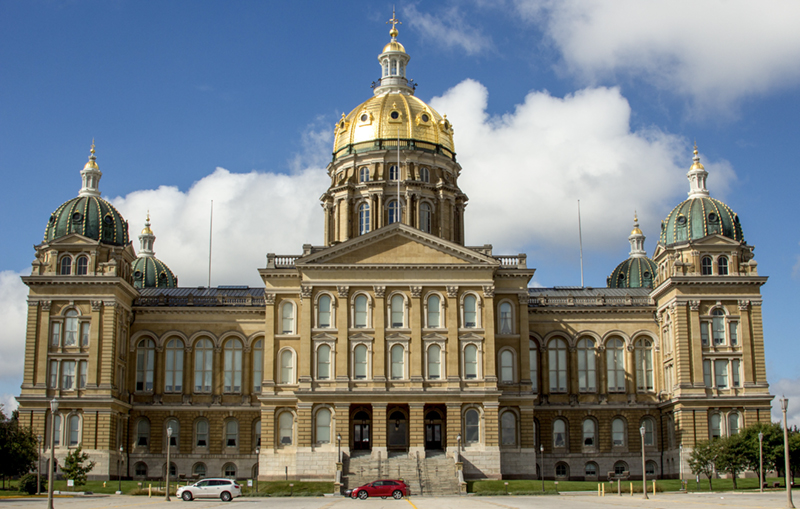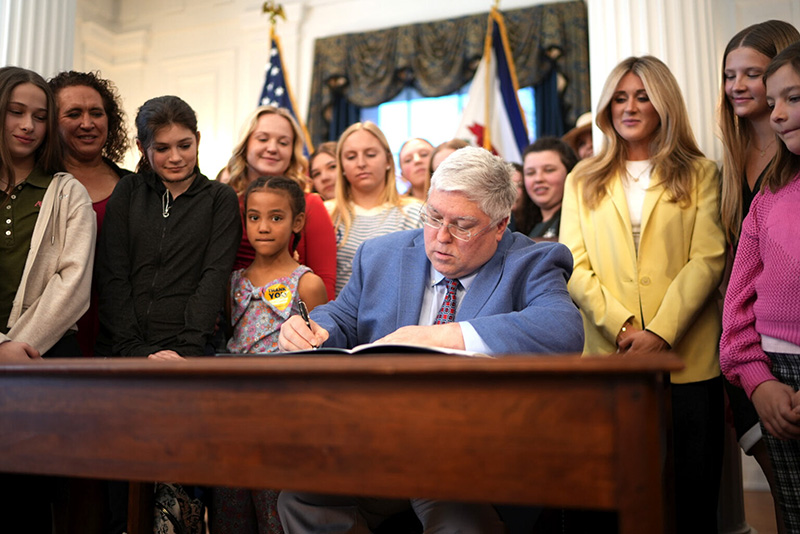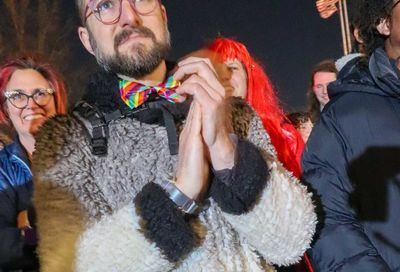Virginia Students Protest Anti-Trans Policies with Walkouts
Thousands of high school students across Virginia held walkouts to protest policies seeking to roll back transgender student protections.

Thousands of students in Virginia public schools held walkouts across the commonwealth on Tuesday, Sept. 27.
The walkouts protested “model policies” adopted by the Virginia Department of Education earlier this month at the behest of Gov. Glenn Youngkin’s administration.
Critics say the policies unfairly target and single out transgender and nonbinary students for discrimination and harassment at the hands of fellow students, teachers, and administrators.
Students streamed out of their classrooms in the morning to speak against the policies, which require parental permission before trans-identifying students can be addressed by names or pronouns that do not match their assigned sex at birth.
The policies restrict participation in certain school programs and the use of school facilities based on students’ assigned sex at birth, although they do allow schools to make special accommodations for transgender students, such as the use of single-user bathrooms, for example — the details of which must be worked out between school officials and parents.
The previous state guidelines, which rankled conservative parents when they were adopted last year by Democratic Gov. Ralph Northam’s administration, allowed students to participate in programming and access facilities consistent with their gender identity and urged teachers and administrators to consider whether to share information on students’ gender identities with parents on a “case-by-case” basis.
Representatives from the Pride Liberation Project, a student-run statewide collective advocating for protections for LGBTQ individuals in schools and the chief organizer of the walkouts, reported hundreds of participants at several Northern Virginia high schools. Many students carried signs protesting the new “model policies” and chanted slogans like, “Protect trans youth!” “Trans rights are human rights!” and “D-O-E [Department of Education], leave us be!”
Aerial footage from news helicopters showed similar turnout at two Prince William County high schools, and reports from throughout the state reported hundreds of students participating in larger, population-heavy school districts in the Richmond and Hampton Roads area.
There were also reports of smaller protests, featuring a few dozen or a handful of students walking out of class, in smaller, more rural districts or high schools in areas that are extremely politically conservative.
Defenders of the policies say the changes respect the role of parents in making decisions in the best interest of their children, and keep parents “in the loop” about the way that schools may be treating children who identify as LGBTQ and what services they may be providing to them.
Other supporters of the Youngkin-favored policies have hailed provisions that protect school employees and students from being compelled to refer to transgender or nonbinary students in a way that violates their constitutionally protected right to free speech, or forcing them to use pronouns that conflict with their religious beliefs regarding sex and gender.
Controversies in recent years have seen a Virginia teacher sue for being fired for allegedly not using a transgender student’s correct pronouns, and teachers in Loudoun sue over their objections to trans-affirming policies.
One elementary school physical education teacher, Tanner Cross, was disciplined after stating during the public comment period at a school board meeting that his religious beliefs prevent him from referring to transgender students by names or pronouns that do not match their assigned sex at birth.
Cross’s suspension was eventually reversed by the Virginia Supreme Court.
The proposed model policies are currently in the midst of a public comment period that lasts until Oct. 26.
As of Tuesday, more than 17,000 comments from parents and students had been submitted to the Virginia Department of Education. The majority of those submitted appear to oppose the proposed policies, although there are plenty of supportive comments as well.
VDOE reserves the right to edit the policies based on public feedback before they are finalized by the state superintendent of education, but skeptics say that the department is unlikely to make any changes and will ultimately kowtow to the governor’s wishes.

Once finalized, the department expects school districts to adopt policies “consistent with” the model policies, although some districts in more liberal areas have signaled they may not fully comply — just as some more conservative districts, such as Hanover County, flatly refused to comply with the 2021 guidelines.
State law is silent on how VDOE can enforce its preferred policies, although the 4th U.S. Circuit Court of Appeals, which oversees Virginia, has previously found that some policies that single out transgender students in terms of restroom access may be unconstitutional.
When asked for comment on the protests, a spokeswoman for Gov. Youngkin told the Associated Press that VDOE’s proposed policies make it clear that when parents are part of the process, schools will accommodate the requests of children and their families.
“While students exercise their free speech today, we’d note that these policies state that students should be treated with compassion and schools should be free from bullying and harassment,” spokeswoman Macaulay Porter said in a statement.
Students who will be impacted by the policies say that they’ve been marginalized and had their voices ignored by not only the Youngkin administration but conservative media outlets, which frequently misrepresent their statements or spread falsehoods about groups like the Pride Liberation Project.
A trans senior at West Potomac High School in Fairfax County who goes by the first name Golden told Metro Weekly that he would personally be affected by the policies because he uses pronouns that don’t align with his assigned sex at birth and uses a name different than the one that appears on his birth certificate.
But, as a senior, he says those most affected by the policy will be underclassmen and trans students in middle and elementary school, who will no longer have their gender affirmed under the new policies.

Golden was one of the official speakers at the walkout. He says the proposed VDOE policies seem to unfairly favor students with anti-LGBTQ beliefs over transgender students by potentially allowing the former group to misgender and harass the latter group.
“I find it would lead to more suppression of the students who are transgender, because this is not stopping those people from having their [anti-LGBTQ] beliefs and their feelings,” he said. “But if these policies were put into place, it would discriminate against trans youth so they wouldn’t be able to use the names and pronouns that they prefer.”
Golden points to the fact that even though nearly half the student body at West Potomac High School participated in the walkout, a handful of students sat in the bleachers at the school stadium and heckled or talked over speakers, making rude comments, throughout the rally.
Those students were allowed to express themselves and were not silenced by other students or adults who attended the rally, including some local elected officials who came out to show support for the trans and allied students.
Mara Surovell, a 17-year-old senior who identifies as questioning and a co-organizer of the West Potomac walkout, says she is concerned that the proposed policies will negatively impact the mental health of her transgender and nonbinary peers, which will, in turn, affect their grades and their social lives.
“If this policy gets passed, teachers and administrators will now have the option to deadname and misgender students,” Surovell said.
Catherine Knecht, a 17-year-old senior at Langley High School in McLean, where about 200 students walked out as part of a 20-minute demonstration, says that by allowing deliberate misgendering of trans students and requiring teachers to “out” trans students to their parents prioritizes “the wants of parents over the needs of their children.”
“I personally have been blessed to have really supportive parents,” said Knecht, who identifies as queer. “But as someone who has struggled with gender identity, I do not like the fact that schools will not allow the use of nonbinary pronouns, because that is an incredibly important part of a lot of people’s identities…. I know many people around me who would suffer greatly, mainly because a large part of the policy is forcing schools to out genderqueer students to their parents without their consent.”

Knecht worries that some children who are outed to their parents may be placed in potentially unsafe home environments, or could be thrown out of their homes by unaccepting parents.
She also said, that, in general, the coming out process takes time and that youth should be allowed to explore their identity and test their comfort level before sharing such information with friends or family.
“Identity, especially in your early teens, is very fluid,” she said. “It’s normal to start questioning that and changing the way you identify.”
Knecht believes the entire rallying cry around “parental rights” is a smokescreen for advancing a more hostile anti-LGBTQ political agenda, which involves the suppression of LGBTQ identity and freedom of expression, and condones discrimination against those who are out.
“A really large part of what makes this an issue is the fact that Youngkin is using this shield of ‘parental rights’ as a way to push a political agenda,” she added. “It obviously incorporates religion, which is a whole other issue. Schools need to be somewhere where we can become educated and where we can be safe. And this is taking away some of that safety.”
There appears to be a deliberate conflation — especially by conservative media, which seeks sensationalistic headlines — of social transition, which includes the use of names, pronouns, and acknowledgment of a child’s gender identity, and medical transition, which even some transgender adults ultimately choose not to undergo.

“Currently, [under the 2021 VDOE policies] we are able to go by a different name from our legal name or different pronouns not associated with our gender assigned at birth,” Knecht said. “But the new model policies basically state that you can’t go by a different name from your legal name, so you would have to get your name legally changed, which is an incredibly difficult process. And you would also have to get your gender legally changed, which is also an incredibly difficult process. But both are social processes, not medical processes, and they’re not irreversible.”
Casey Calabia, a 17-year-old senior at McLean High School and an organizer with the Pride Liberation Project, says the new guidelines would be a slap in the face because teachers would be prevented from respecting their pronouns and the name by which they prefer to be addressed.
Calabia says they are sympathetic to some parents’ genuine concerns about being knowledgeable about what is going on in their children’s lives, but says gender-affirmation policies are not the cause of any rifts between parents and their children.

“LGBTQ teachings and acceptance in school hurts nobody,” said Calabia. “Having queer culture and existence acknowledged in the classroom does not make anybody queer. You are born queer and all it does is affirms to these kids that it is okay to be themselves and that it is okay to be loved.”
Calabia is critical of opponents of LGBTQ identity and expression, who have mobbed local school meetings and made comments casting queer people as an “evil bogeyman in the corner as opposed to human beings with lives and diversity and a beauty of their own.”
They said that recent social media posts by right-wing organizations claiming that students are being “manipulated” by adults to further a progressive agenda are completely false and a misrepresentation of the facts.

“I’ve seen those accusations as well. They’re completely ridiculous,” said Calabia. “The Pride Liberation Project is just one banner for queer students to work under. We are completely student-led and have been from the beginning. To see our work dismissed as just adults ‘manipulating’ us is just really underestimating how much our voices matter and how good we are at what we do.”
Calabia said that while most seniors aren’t eligible to vote, they can talk to adults who are of age to vote for LGBTQ-supportive candidates. They say that Pride Liberation Project has plans to send students to school board meetings across the state to ensure their opposition to the model policies is heard, in the hope that some districts will resist adopting them.
Despite the rough road that student activists face in combating the VDOE proposed policies, Calabia says they find their activism motivating, rather than draining.
“It’s hard work, no one is going to deny that,” they said. “But it is the work that lets me sleep at night. It’s the comforting thought that I know that there are thousands of other students [across the state] who are like-minded and will work just as hard as me to make sure that our community is kept safe.”
Support Metro Weekly’s Journalism
These are challenging times for news organizations. And yet it’s crucial we stay active and provide vital resources and information to both our local readers and the world. So won’t you please take a moment and consider supporting Metro Weekly with a membership? For as little as $5 a month, you can help ensure Metro Weekly magazine and MetroWeekly.com remain free, viable resources as we provide the best, most diverse, culturally-resonant LGBTQ coverage in both the D.C. region and around the world. Memberships come with exclusive perks and discounts, your own personal digital delivery of each week’s magazine (and an archive), access to our Member's Lounge when it launches this fall, and exclusive members-only items like Metro Weekly Membership Mugs and Tote Bags! Check out all our membership levels here and please join us today!

























You must be logged in to post a comment.